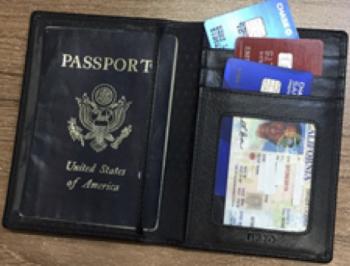Securing your personal information on RFID chips
This item appears on page 47 of the December 2017 issue.
There is a lot of confusion and fear among consumers when it comes to protecting their personal information on credit cards containing computer chips and on US passports with RFID chips buried inside. Also, some states issue so-called “enhanced driver’s licenses” with RFID chips.
Here’s a simple explanation of this technology and how you can guard against data theft.
Credit cards with chips
As a means to combat counterfeiting of credit cards, credit card companies have adopted the EMV chip technology for most, if not all, cards produced in the US since 2015. You can identify the EMV chip as the gold metallic rectangle on your credit card that looks similar to this:
The EMV chip is a microprocessor, but it does not use Radio Frequency Identification (RFID) to communicate with a chip reader. The EMV credit card must be inserted into a reader to be scanned.
The surreptitious scanning that has gotten a lot of media attention involves RFID chips, which some credit cards use. The RFID chip is recognized on cards with this symbol:
The presence of an RFID chip allows contactless transmission of data, so, to complete a transaction, you simply have to be in close proximity but not physically touching a reader, similar to the way Apple Pay and Google Pay work from your smartphone.
An RFID chip can be scanned by data thieves. However, you can protect these cards with an RFID-blocking wallet, backpack or handbag. RFID-blocking fabric contains metallic fibers, which scatter the radio waves.
There are several manufacturers that incorporate this fabric on interior bag pockets, and it is often identified by the symbol…
US passports
US passports each have an RFID chip inside that contains all the data printed on the information page. However, US passports provide several levels of security.
First, the cover contains RFID-blocking material, so the passport must be opened to be scanned successfully.
Second, the scanner must read the printed lines of data in the so-called machine-readable zone on the information page in order to access the data on the chip, like using a key to unlock a door. These are substantial obstacles to keep data thieves from successfully scanning your closed passport in your hand or in your pocket or purse.
If you’re still anxious about guarding your passport data, RFID-blocking wallets, handbags and backpacks provide an additional level of protection.
Enhanced driver’s licenses
What some consider the most serious risk to individual privacy, if not security, are the enhanced driver’s licenses that some states issue, which, among other features, make for quicker access to biographic data by Customs & Border Patrol (CBP) agents when being carried or driven through US border checkpoints.
As you physically approach a checkpoint, CBP scanners can detect your individual identification number on your driver’s license chip and retrieve your personal information from a government database.
No personal information is stored on the RFID chip, only a unique number to access data stored elsewhere. Even if someone surreptitiously scanned your chip, the information is meaningless.
The bigger concern is the potential for authorities to track your movements at other locations around the country by installing and activating scanners. Civil liberties groups have challenged the necessity of tracking citizens this way, raising the specter of government abuse.
At this time, California, for one state, does not issue enhanced driver’s licenses. Nevertheless, if even the remote possibility of your being tracked via your driver’s license makes you a little anxious, tucking your license in an RFID-blocking wallet or handbag will prevent its being scanned.
Mark Gallo is the owner of CircaTerra Travel Outfitters (Santa Barbara, CA; 805/568-5402, circaterratravel.com), and he can be reached at mgallo@circaterratravel.com.

